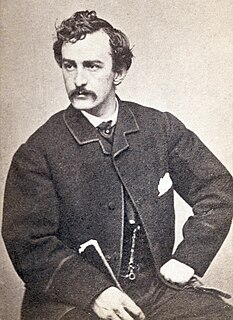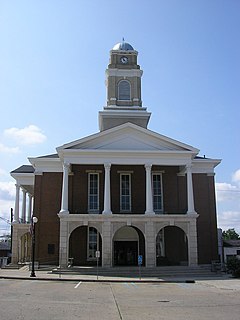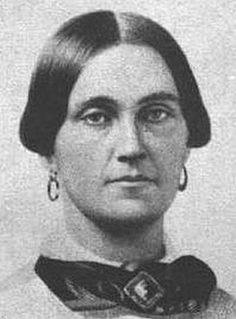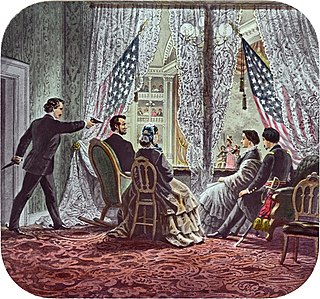See also
- John J. Lincoln House, historic building in Elkhorn, West Virginia.
John Lincoln may refer to:

Abraham Lincoln was an American lawyer and statesman who served as the 16th president of the United States from 1861 until his assassination in 1865. Lincoln led the nation through the American Civil War and succeeded in preserving the Union, abolishing slavery, bolstering the federal government, and modernizing the U.S. economy.

John Wilkes Booth was an American stage actor who assassinated United States President Abraham Lincoln at Ford's Theatre in Washington, D.C., on April 14, 1865. A member of the prominent 19th-century Booth theatrical family from Maryland, he was a noted actor who was also a Confederate sympathizer; denouncing President Lincoln, he lamented the recent abolition of slavery in the United States.
Clinton is an English toponymic surname, indicating one's ancestors came from English places called Glympton or Glinton. Clinton has frequently been used as a given name since the late 19th century. Baron Clinton is a title of peerage in England, originally created in 1298.

Garrard County is a county located in the Bluegrass Region of Kentucky. As of the 2020 U.S. Census, the county's population was 16,953. Its county seat is Lancaster. The county was formed in 1796 and was named for James Garrard, Governor of Kentucky from 1796 to 1804. It is a prohibition or dry county, although its county seat, Lancaster, is wet. Lancaster was founded as a collection of log cabins in 1776 near a spring that later provided a constant source of water to early pioneers. It is one of the oldest cities in the Commonwealth. Boonesborough, 25 miles to the east, was founded by Daniel Boone in 1775. Lexington, 28 miles to the north, was founded in 1775. Stanford, originally known as St. Asaph, is 10 miles south of Lancaster. It too was founded in 1775. The oldest permanent settlement in Kentucky, Harrodsburg, was founded in 1774 and is 18 miles to the west. Garrard's present day courthouse is one of the oldest courthouses in Kentucky in continuous use.
John Thompson may refer to:

Mary Elizabeth Jenkins Surratt was an American boarding house owner in Washington, D.C., who was convicted of taking part in the conspiracy which led to the assassination of U.S. President Abraham Lincoln in 1865. Sentenced to death, she was hanged and became the first woman executed by the U.S. federal government. She maintained her innocence until her death, and the case against her was and remains controversial. Surratt was the mother of John Surratt, who was later tried, but due to statute of limitations, was not convicted.

The oath of office of the president of the United States is the oath or affirmation that the president of the United States takes upon assuming office. The wording of the oath is specified in Article II, Section One, Clause 8, of the United States Constitution, and a new president must take it before exercising or carrying out any official powers or duties.
John Parker may refer to:
John, Johnny, or Jock Simpson may refer to:

Lincoln Memorial University (LMU) is a private university in Harrogate, Tennessee. LMU's 1,000-acre (4.0 km2) campus borders on Cumberland Gap National Historical Park. As of fall 2019, it had 1,975 undergraduate and 2,892 graduate and professional students.

Joseph Holt was an American lawyer, soldier, and politician. As a leading member of the Buchanan administration, he succeeded in convincing Buchanan to oppose the secession of the South. He returned to Kentucky and successfully battled the secessionist element thereby helping to keep Kentucky in the Union. President Abraham Lincoln appointed him the Judge Advocate General of the United States Army. He served as Lincoln's chief arbiter and enforcer of military law, and supporter of emancipation. His most famous roles came in the Lincoln assassination trials.

Joshua Fry Speed was an American politician who was a close friend of future President Abraham Lincoln from his days in Springfield, Illinois, where Speed was a partner in a general store. Later, Speed was a farmer and a real estate investor in Kentucky, and also served one term in the Kentucky House of Representatives in 1848.
John Todd or Tod may refer to:
John Ward may refer to:

John Patsalos is an American former neo-Nazi who was convicted of the August 25, 1967 murder of American Nazi Party leader George Lincoln Rockwell.
George Miller may refer to:

On April 14, 1865, Abraham Lincoln, the 16th president of the United States, was assassinated by well-known stage actor John Wilkes Booth, while attending the play Our American Cousin at Ford's Theatre in Washington, D.C. Shot in the head as he watched the play, Lincoln died the following day at 7:22 am in the Petersen House opposite the theater. He was the first U.S. president to be assassinated, with his funeral and burial marking an extended period of national mourning.
Benjamin Thomas may refer to:

Claimed coincidences connecting U.S. Presidents Abraham Lincoln and John F. Kennedy are a piece of American folklore of unknown origin. The list of coincidences appeared in the mainstream American press in 1964, a year after the assassination of John F. Kennedy, having appeared prior to that in the GOP Congressional Committee Newsletter. In the 1970s, Martin Gardner examined the list in an article in Scientific American, pointing out that several of the claimed coincidences were based on misinformation. Gardner's version of the list contained 16 items; many subsequent versions have circulated much longer lists.
John Vaughan may refer to: